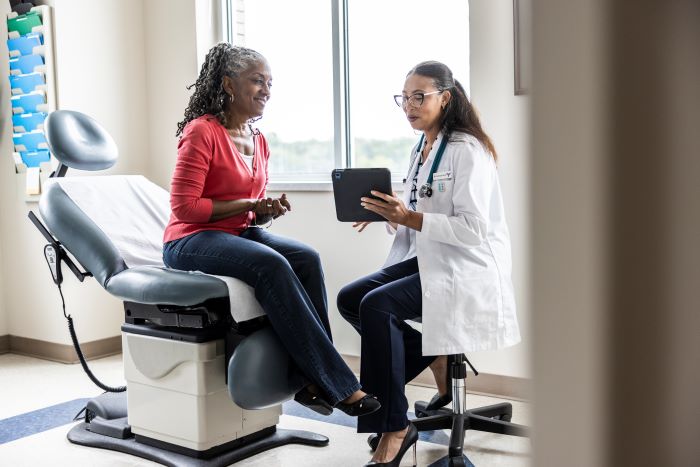When you’re young, you may take advantage of time and postpone doctor’s visits. When you’re older, putting off a trip to the doctor can happen because, well, ‘life,’ and you wrap yourself in a cycle of “I’ll get to it soon.”

When it comes to specific issues such as uterine cancer, it is important to prioritize your health, especially if you are a Black woman or a Black person with a uterus. Uterine cancer is when the cells of the uterus grow out of control. The most common type of uterine cancer is endometrial cancer (EC), where the cells are growing out of control in the lining of the uterus called the endometrium.
According to the Centers for Disease Control and Prevention (CDC), Black women are diagnosed with uterine cancer at higher rates and have a higher mortality rate compared to other ethnic groups. This unwanted spotlight on Black women is exactly why knowing about it, catching it early, and learning about treatment options available is so important.
So, what exactly can you do to prevent uterine cancer? Because there is no screening for it (Pap and HPV tests only screen for cervical cancer and do not screen for uterine cancer), it’s of the utmost importance to learn the signs and symptoms because treatment works best when the cancer is found early. We spoke with Dr. Jessica Shepherd, MD, MBA, FACOG and asked about any early-detection strategies and steps you can take to reduce your risk.
“Early detection strategies include understanding signs like abnormal bleeding, including any vaginal bleeding that takes place after menopause or, if you are still having your cycles, any significant change in your bleeding pattern,” she explained. Moreover, it is important to understand that maintaining a healthy weight and being physically active can help lower your chances of getting uterine cancer.
The risk of uterine cancer increases with age, making continued gynecologic care after menopause or after having children essential. “Most women diagnosed with uterine cancer are diagnosed in the peri-menopausal or menopausal phase, so that shows that the main risk factor for uterine cancer is going to be age,” Dr. Shepherd noted.
Additionally, a family history of uterine, colon, rectal, ovarian and some other cancers can increase your risk. Learn as much as possible about your family health history, share what you learn with a doctor, and ask them if genetic counseling and testing is right for you. If you have a high risk of some cancers due to a family history, there are things you can do to lower your risk.

So, what’s the takeaway? Prioritizing your health by staying on top of routine gynecologic health appointments and seeing a doctor immediately if you have any abnormal bleeding is crucial. While Black women have a higher risk of being diagnosed with uterine cancer, treatment works best when it is detected early. You can lower your risk by maintaining a healthy lifestyle and understanding your personal risk factors, like your family health history. Remember, your health is your most valuable asset, and proactive care is the best defense.

